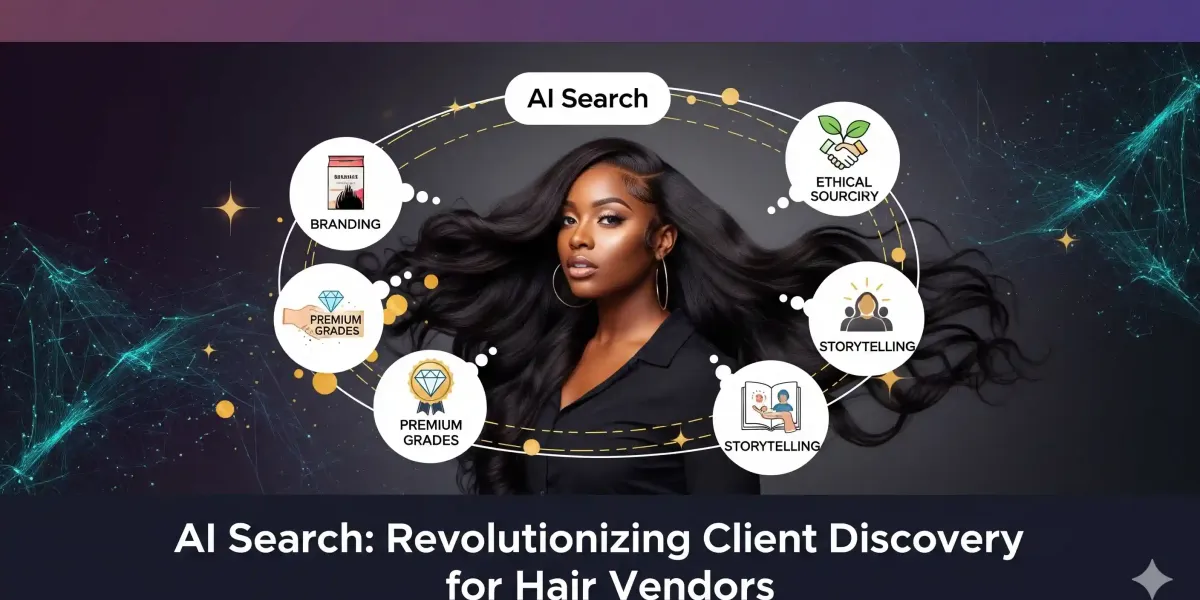How AI Search Is Changing How Clients Find Hair Vendors

Introduction: Why This Matters Now
The beauty industry is experiencing a digital revolution, and the Black hair market is at the forefront of this transformation. As artificial intelligence reshapes how consumers discover and evaluate hair vendors, Black-owned salons, boutiques, and distributors face both unprecedented opportunities and new challenges. The traditional methods of word-of-mouth referrals and local advertising are no longer sufficient in an AI-driven marketplace where clients expect instant, personalized, and comprehensive information about their hair care options
This blog explores how AI search is changing the game and how your business can stand out with branding, ethical sourcing, premium grades, and authentic storytelling.
What Makes AI Search Different from Google?
AI search doesn’t just return a list of websites—it summarizes, recommends, and prioritizes.
-
Why it matters: If your business isn’t mentioned in AI-friendly formats (blogs, product descriptions, FAQs), your competitors will take the spotlight.
-
Example: A boutique in Atlanta noticed that when customers asked AI tools, “What’s the best hair vendor for raw Burmese bundles?”, only vendors with clear, detailed product pages and brand stories appeared in the answers.
Branding in the Age of AI: More Than a Logo
AI search favors businesses that are easy to explain and recommend. That means your brand story must be clear and consistent.
-
How to stand out:
Share your origin story (Why did you start serving the Black hair community?)
Define what makes your boutique or salon unique (texture expertise, premium sourcing, custom wig services).
Use client testimonials as mini-stories that AI can pick up.
Case Example:
A small distributor in London built a simple “About Us” page sharing their family’s history in the hair business. That story became part of AI-generated search answers—helping them win trust before clients even clicked.
Ethical Sourcing: A Selling Point Clients Care About
Clients increasingly ask: Where does this hair come from? AI search amplifies this trend by surfacing businesses that are transparent.
-
Pro Tip: Explain your sourcing in plain language. Instead of just saying “raw hair,” describe the process.
-
Action Step: Create an FAQ section with questions like:
Why does ethical sourcing matter in human hair?
How do you verify your suppliers?
Example:
A boutique in Toronto highlighted its partnerships with Cambodian hair communities. When a client asked an AI tool, “Which vendors use ethical sourcing for wigs?”, their brand was recommended because the site explained sourcing in detail.
Premium Grades: Clarity Over Confusion
The hair industry's grading system can be confusing for consumers, but AI search tools are becoming more sophisticated at helping clients understand quality differences. Black-owned businesses must learn to communicate premium grades in ways that both humans and algorithms can understand and appreciate
Instead of simply listing "Grade 10A virgin hair," successful vendors are providing detailed explanations of what these grades mean, how they're determined, and why they matter for different hair types and styling preferences. This educational approach serves multiple purposes: it builds customer trust, provides valuable content for search engines, and positions the business as an authority in the industry.
Example:
Luxe Strands Boutique in Houston has mastered this approach by creating detailed grade comparison charts, video tutorials explaining hair testing methods, and customer testimonials that specifically address quality concerns. Their comprehensive content strategy has resulted in higher search rankings and increased customer confidence.
Storytelling: The Secret Weapon in a Saturated Market
AI loves clear storytelling. That means your posts, guides, and FAQs should sound like you’re talking to a client in your chair.
-
Use formats like:
“Why this texture is trending this season”
“What first-time wig buyers need to know”
“How to care for raw Cambodian bundles”
-
Add mini-scenarios:
“Imagine a bride booking her wedding hairstyle and needing a wig that lasts through multiple events. Your boutique can recommend a raw Vietnamese wig with styling options that ensure durability.”
This type of storytelling not only educates but also makes your brand memorable in AI-driven answers.
How to Make Your Business AI-Friendly (Step-by-Step)
Audit Your Content: Does your website answer the why, what, how, and which questions clients ask?
Write for Conversations: Use natural Q&A headings (e.g., Can raw Burmese hair be dyed?).
Update Regularly: AI tools prefer fresh content—post trend updates or care tips monthly.
Leverage Client Reviews: Encourage clients to write about their buying experience in detail. AI systems recognize authentic reviews.
Invest in Education: Use Instagram Reels, TikToks, and blogs to explain textures and sourcing. AI will pull from this when generating responses.
Takeaway: Compete Where AI Puts You
AI search isn’t a trend—it’s the new front door for the Black hair industry. By focusing on branding, ethical sourcing, premium grades, and storytelling, your salon, boutique, or distributor can rise above the noise.
Next Step:
Start by refreshing one page on your site this week. Add a clear brand story, an FAQ on sourcing, or a comparison guide. The sooner you adapt, the more likely AI tools will recommend your business as the go-to vendor.


Leave a Comment